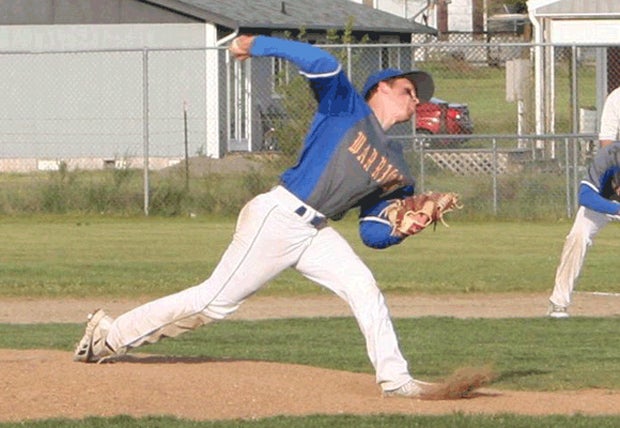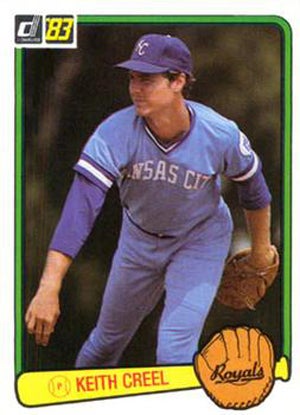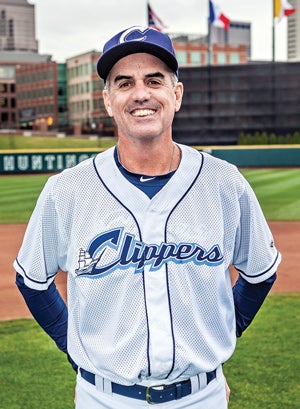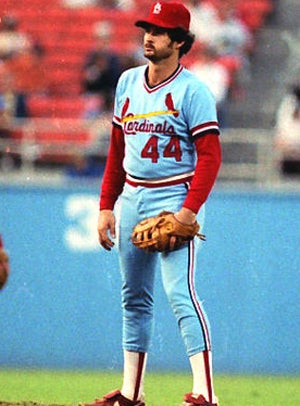A pair of Oklahoma and Texas pitching duos threw well over 200 pitches each in their marathon duels.

Dylan Fosnacht's lengthy outing - which featured 194 pitches - has once again kickstarted the debate over high school pitch counts. MaxPreps tracked down pitchers who took part in similar games in their prep days, decades ago.
Facebook photo
When
Dylan Fosnacht of
Rochester (Wash.) threw 194 pitches in a 14-inning win over La Center,
his test of endurance was mentioned by news services across the nation.
Take a trip in the way-back machine to high school baseball in the 1970s, however, and Fosnacht's outing would have barely registered among some of the marathon contests that occurred during those days. Huge pitch counts and long stints on the mound were the norm rather than a rarity then.

Keith Creel
Photo courtesy of tradingcarddb.com
The
National Federation of State High School Associations Record Book lists a pair of long pitching duels that produced two of the highest combined strikeout totals in national history. The pitchers involved all say that they threw way more than 200 pitches. One of the contests was between two large schools in Texas while the other pitted a pair of small schools in Oklahoma.
In 1977, Keith Creel of
Duncanville (Texas) and Tony Arnold of
Irving (Texas) waged a battle for the ages when they each threw all 15 innings of a district game. The two combined for 57 strikeouts and an estimated 530 pitches before Duncanville scored an unearned run in the 15th to claim a 2-1 victory.
Creel, the winner of the game, said that his coach told him that he threw 258 pitches in the game, however he never felt that he needed to exit the game.
"I was mostly a fastball pitcher, so it was a little easier on my arm," said Creel. "However I remember that I couldn't even get out of bed the next morning."
Arnold, who was more of a breaking ball pitcher, estimated that he threw about 280 pitches in the game. He also learned a valuable lesson following the outing.
"That was the first time I ever iced my arm after a game," said Arnold. "It felt terrible after icing it so I never did that again."
Arnold recalled the game with vividness as if it occurred yesterday.
"The leadoff guy in the 15th inning got a triple. I struck out the next two guys, but a ground ball went through the second baseman's legs for the go-ahead run," said Arnold. "I remember my coach asking me every inning if I wanted to come out of the game. I told him there's no way I'm coming out of this game."
Arnold had 31 strikeouts in the game while Creel finished with 26. Creel's team went on to finish second in the state that season, falling to Sharpstown in the Class 4A state title game. Duncanville had won state titles in 1975 and 1976 and Creel finished his career with a state-record 55 wins.

Tony Arnold
Photo courtesy of Columbus Clippers
The 15-inning marathon wasn't even the only time Arnold appeared in such a contest. Later that year, Arnold went 14 innings against Glen Pierce of MacArthur (Irving) and struck out 26 batters (Pierce had 24 strikeouts).
The 15-inning game was not the last time that Arnold and Creel would meet, however. Both players headed to the University of Texas and ended up as college roommates.
"We talked about that game a lot when we were in college," said Creel.
"His team won," said Arnold. "So he had final say on that argument. However, I did have more strikeouts."
Both excelled at Texas with Creel earning All-Southwest honors in 1978 and 1980 and Arnold doing the same in 1981. Both Creel and Arnold went on to play professional ball as well. Creel was the fourth overall pick in the 1980 MLB Draft by the Kansas City Royals and pitched four seasons in the Major Leagues and had a 5-14 overall record with Kansas City, Cleveland and Texas. A rotator cuff injury in 1988 marked the end of his career. Creel currently owns his own construction company in Texas.
Arnold, meanwhile, went to the Baltimore Orioles in the 10th round of the 1981 draft. Arnold played most of his career at the minor league level, but he did see two stints with the Orioles in 1986 and 1987 as a relief pitcher. He is currently the pitching coach with the AAA Columbus Clippers in the Cleveland Indians organization.
Both Creel and Arnold have their own opinions about why young pitchers have suffered so many arm injuries.
"Nowadays, these kids are so big and strong and their workouts are nine times what we had," said Creel. "Your arm is not made to make that type of motion. Softball pitching is a more natural motion. The bigger and stronger you are the more you tear it."
Arnold agreed and noted that pitch count wasn't the issue.
"We have this conversation all of the time. You go through cycles with this type of surge of injuries and we are still trying to figure it out," said Arnold. "It's not the pitch count, because that is closely monitored. I do know that these young guys coming up have played way more games than we ever did with all of the travel teams and summer tournaments. That's a lot of wear and tear early in their careers. There's that saying, "There's only so many bullets in the gun," meaning there's only so many pitches in an arm."
A pair of Oklahoma pitchers actually hold the record for most combined strikeouts in one game. Billy Brimm of
Asher (Okla.) struck out 37 batters in October of 1971 during the Class B Fall State Championships while his opposite, Joe Edelen, struck out 35 for
Gracemont (Okla.). Asher won the game 1-0 in 17 innings for the second of five straight state titles it won during the 1970s.

Joe Edelen
Photo courtesy of ootpdevelopments.com
"Asher had won multiple state tournaments before this game and while we were warming up, I overheard the very elderly home plate umpire say, ‘I don't know why we're playing this game. We know who's going to win,'" said Edelen, whose only loss that season was the 17-inning game. "After 12 innings, I remember Asher's coach coming over and asking if we wanted to share the co-championship. The whole team answered ‘No'. I remember the game started at 7 p.m. and didn't end until 1:30 the next morning."
Edelen and Brimm had never met in a game before and they never would again. Brimm, whose national record of 37 strikeouts in a game would last 33 years until Joe Labek of Ridgewood (Norridge, Ill.) broke it with 40 in 2004, died in an automobile accident following his graduation from high school.
Edelen grew up in Gracemont, a town that has only gotten smaller since he graduated in the early 1970s. The 2010 census lists Gracemont with only about 350 residents in the town. Asher is not much bigger with just over 300 residents.
"I think they only have 25 or so in the high school," said Edelen, whose 35 strikeouts still rank third all-time. "There's only one gas station and a grocery store."
While Edelen lived in a small town, he was a big-time talent. He was a high school All-American in two sports coming out of high school and he was highly coveted in both baseball and basketball. He was originally headed to play both sports at the University of Tulsa, but instead he was chosen in the first round of the 1973 Draft and played third base in the St. Louis Cardinals organization for three years before moving to pitcher. Edelen played two seasons in the Major Leagues, pitching for St. Louis as a reliever in 1981 and Cincinnati in 1982.
Reflecting back on his marathon game against Brimm, Edelen said he doesn't know why he pitched all 17 innings.
"I never knew why I threw all those innings. I think the most I'd ever gone before was 10," said Edelen. "I don't remember feeling tired. I think the adrenalin kicked in. I know my arm was a little sore, but I was out the next day shooting hoops because basketball practice started the next day."
Edelen doesn't recall how many pitches he threw, but he believes it was well over 200.
"I don't think it ever had an effect on my arm," he said. "It probably helped in a lot of ways. Knowing that I had to keep keeping on if I wanted to win turned it into a stamina lesson."
Some other marathon pitching notes:
* Joe Labek of
Ridgewood (Norridge, Ill.) set the national record for strikeouts with 40 in a 24-inning game that spanned two days played a week apart. Labek, who didn't even start the game, came in to pitch in the fourth inning and threw the final 21 innings. The game ended a 0-0 tie and was suspended in the 12th inning. Labek started the game when it was continued a week later and pitched all 12 innings. Ridgewood actually lost the game to Evergreen 2-1. He struck out 18 batters in the first nine innings he pitched and 22 in the final 12 innings.
* E.V. Spell once struck out 33 batters in a 14-inning game in 1968 for Clement in a 1-0 win over Garland. His counterpart Larry Smith reportedly struck out 27 for a combined total of 60. This total, which is listed in the North Carolina High School Athletic Association record book, would actually rank second all-time, but it is not currently listed in the NFHS Record Book.